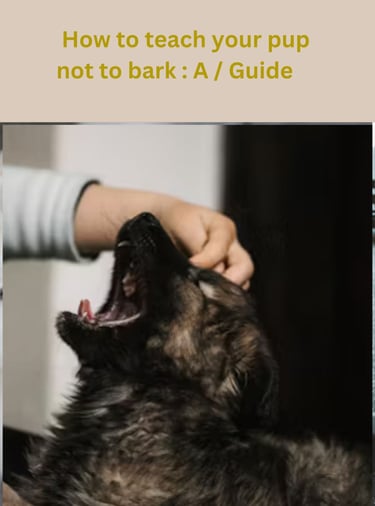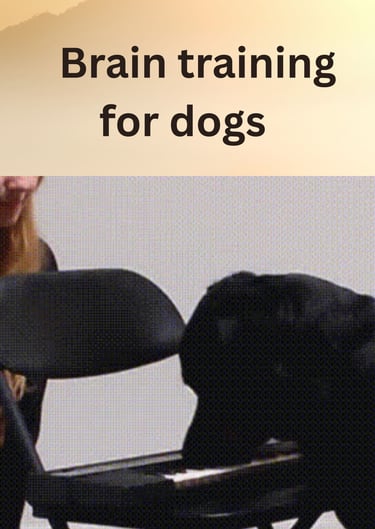Elevate Your Puppy’s Skills: Advanced Training Techniques
Edvanced Training Techniques Explore advanced training to further enhance your puppy's skills & behavior management'


Advanced Training Techniques for Enhanced Puppy Skills and Behavior Management
As a dog owner, you're likely eager to help your puppy develop into a well-behaved and skilled companion. While basic training provides a solid foundation, advanced training techniques can further enhance your puppy's skills and behavior management.
In this article, we'll explore the benefits of advanced training, discuss various techniques, and provide tips on how to implement them effectively.
Benefits of Advanced Training
Advanced training offers numerous benefits for puppies, including:
1. Improved obedience: Advanced training helps reinforce basic commands and introduces new, more complex ones, ensuring your puppy responds promptly and reliably.
2. Enhanced communication: By teaching your puppy to respond to subtle cues, gestures, and commands, you'll strengthen your bond and improve communication.
3. Increased confidence: As your puppy masters new skills, they'll become more confident and self-assured, leading to a more fulfilling relationship.
4. Better behavior management: Advanced training helps address common behavioral issues, such as barking, chewing, or digging, by teaching your puppy alternative behaviors and providing mental stimulation.
5. Competitive edge: If you're interested in competing with your puppy in dog sports or events, advanced training will give you a competitive edge and help you both shine.
6. Improved socialization: Advanced training exposes your puppy to various environments, people, and situations, helping them become more confident and calm in new situations.
7. Mental stimulation: Advanced training provides mental stimulation, which is essential for puppies' cognitive development and helps prevent boredom, stress, and anxiety.
8. Reduced risk of behavioral problems: Advanced training helps prevent behavioral problems, such as fear-based aggression, resource guarding, and separation anxiety, by teaching your puppy to cope with stress and uncertainty.
Techniques for Advanced Training
To take your puppy's training to the next level, try incorporating the following advanced techniques:
1. Clicker training: This positive reinforcement method uses a clicker to mark desired behaviors, making it an effective way to teach complex skills.
2. Shaping: By gradually building new behaviors through a series of small steps, you'll help your puppy develop problem-solving skills and learn to think critically.
3. Chaining: This technique involves linking multiple behaviors together to create a complex action, such as fetching an item and then bringing it back to you.
4. Backchaining: Similar to chaining, backchaining involves starting with the final behavior and working backward to create a seamless sequence.
5. Distraction training: By introducing distractions, such as other people, dogs, or noises, you'll help your puppy develop focus and concentration.
6. Scent work: Teaching your puppy to follow specific scents can be a fun and engaging way to challenge their sense of smell and provide mental stimulation.
7. Agility training: If your puppy enjoys physical activity, agility training can be an excellent way to improve their coordination, balance, and overall fitness.
8. Trick training: Teaching your puppy tricks, such as "play dead" or "roll over," can be a fun way to challenge their cognitive abilities and provide mental stimulation.
Tips for Implementing Advanced Training Techniques
To ensure a successful advanced training experience, keep the following tips in mind:
1. Be patient: Advanced training requires time, effort, and patience. Avoid rushing the process, and let your puppy progress at their own pace.
2. Use positive reinforcement: Reward-based training is essential for building trust and motivation. Use treats, praise, and affection to encourage good behavior.
3. Set clear goals: Define what you want to achieve with advanced training, and break it down into smaller, manageable objectives.
4. Practice consistently: Regular practice helps reinforce new skills and prevents forgetting. Aim for short, frequent training sessions.
5. Stay calm and focused: Maintain a calm, assertive demeanor during training to help your puppy stay focused and responsive.
6. Seek professional help: If you're unsure about how to implement advanced training techniques or address specific behavioral issues, consult a professional dog trainer or behaviorist.
7. Keep training sessions short: Puppies have short attention spans, so keep training sessions short and fun to prevent boredom and frustration.
8. Use high-value rewards: Use high-value rewards, such as treats and praise, to motivate your puppy and reinforce good behavior.
Common Behavioral Issues and Advanced Training Solutions
Every puppy is unique, and some may require special attention to address common behavioral issues. Here are some advanced training solutions for common problems:
1. Barking: Teach your puppy the "quiet" command, and use positive reinforcement to encourage silence.
2. Chewing: Provide alternative chew toys, and engage your puppy in interactive games to redirect their attention.
3. Digging: Create a designated digging area, and teach your puppy to dig in the approved spot.
4. Jumping up: Teach your puppy the "off" command, and reward them for keeping their paws on the ground.
5. Separation anxiety: Gradually increase alone time, and use positive reinforcement to help your puppy develop independence.
6. Fear-based aggression: Desensitize your puppy to the stimulus that triggers the fear, and use positive reinforcement to build confidence.
7. Resource guarding: Teach your puppy to share resources, such as food and toys, and use positive reinforcement to build trust.
8. Housebreaking accidents: Establish a consistent routine, and use positive reinforcement to encourage good housebreaking habits.
Case Studies: Real-Life Examples of Advanced Training in Action
Here are some real-life examples of advanced training in action:
1. Teaching a puppy to navigate an obstacle course: With patience, consistency, and positive reinforcement, a puppy can learn to navigate an obstacle course, improving their coordination, balance, and overall fitness.
2. Helping a puppy overcome fear-based aggression: By desensitizing a puppy to the stimulus that triggers the fear, and using positive reinforcement to build confidence, a puppy can learn to overcome fear-based aggression and become more confident and calm in new situations.
3. Training a puppy to perform complex tricks: With clicker training, shaping, and positive reinforcement, a puppy can learn to perform complex tricks, such as "play dead" or "roll over," providing mental stimulation and challenging their cognitive abilities.
Conclusion
Advanced training techniques offer a world of possibilities for enhancing your puppy's skills and behavior management. By incorporating positive reinforcement, patience, and consistency, you'll be well on your way to helping your puppy become a well-behaved and skilled companion.
Remember to stay calm, focused, and patient, and don't hesitate to seek professional help when needed. With time, effort, and practice, you and your puppy will enjoy a stronger bond, improved communication, and a more fulfilling relationship.
Additional Resources
For more information on advanced training techniques and behavioral issues, consult the following resources:
1. American Kennel Club (AKC): The AKC provides a wealth of information on dog training, behavior, and health.
2. International Association of Animal Behavior Consultants (IAABC): The IAABC is a professional organization that provides resources and support for animal behavior consultants.
3. Karen Pryor Academy: The Karen Pryor Academy offers online courses and training programs on clicker training and positive reinforcement.
4. Dogster: Dogster is an online community that provides articles, blogs, and forums on dog training, behavior, and health.
By following these tips, techniques, and resources, you'll be well on your way to helping your puppy become a well-behaved and skilled companion. Remember to always prioritize positive reinforcement, patience, and consistency, and don't hesitate to seek professional help when needed.











